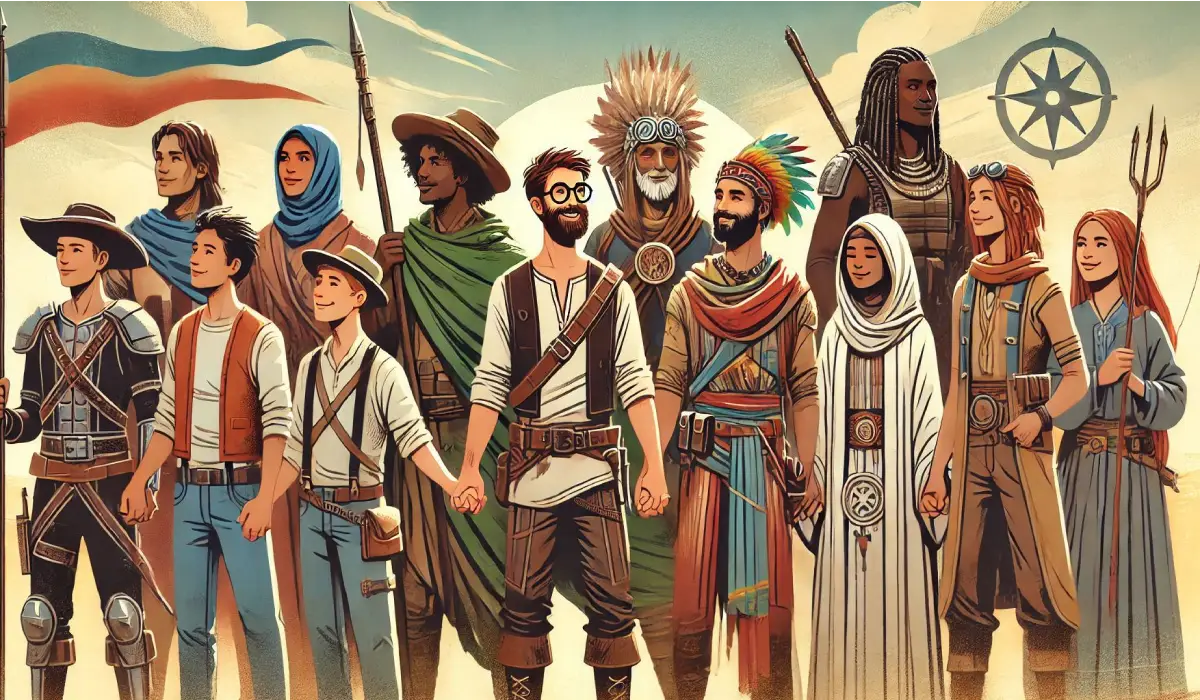A faction is a group within a larger organisation that has differing views or goals. Factions have been key throughout history, in politics, culture and entertainment. Whether in the real world, books or games, factions shape the narrative, provide conflict and represent different ideologies.
In this article, we will explore the fascinating world of names of Factions across history, politics, literature, and gaming. Learn about their origins, characteristics, and roles.
What is a Faction?
At its simplest a faction is a subgroup with different perspectives or objectives within a larger entity. They can be informal or formal depending on the context. In history factions were often the precursor to political parties. For example:
Federalists vs. Anti-Federalists:
In early US history these factions debated the Constitution. Federalists (led by Alexander Hamilton) wanted a strong central government, Anti-Federalists (like Patrick Henry) wanted more state autonomy and a Bill of Rights before the Constitution was ratified.
Jacobins and Girondins:
During the French Revolution these factions had different views on governance. The radical Jacobins wanted big changes, the moderate Girondins wanted a more measured approach.
Factions form in politics, organisations and entertainment nowadays representing different ideologies and goals.
Factions in Pop Culture
Factions are everywhere in storytelling, especially in books, movies and games. Here are some examples:
Books and Movies
- “The Hunger Games” by Suzanne Collins:
- Districts are factions, each specialising in different industries like agriculture or technology. These divisions drive the overall narrative.
- “Divergent” by Veronica Roth:
- Society is divided into five factions, each representing a virtue:
- Abnegation: Selflessness
- Dauntless: Bravery
- Erudite: Knowledge
- Amity: Peace
- Candor: Honesty
- The protagonist Tris challenges this rigid structure, individuality.
Games
- Fallout Series:
- Post-apocalyptic factions:
- Brotherhood of Steel: Preservation of technology.
- Enclave: Return to pre-war governance.
- Raiders: Chaotic bandits.
- World of Warcraft:
- Players choose to be part of the Alliance (order and justice) or Horde (survival and freedom) and thus create a lasting rivalry.
Exploring the Names of Factions Across History and Media
The term “names of factions” often refers to a group within a larger organization that holds differing views or goals. Factions have played pivotal roles throughout history, influencing politics, culture, and entertainment. Whether in the real world, literature, or gaming, factions shape narratives, provide conflict, and represent diverse ideologies.
What is a Faction?
At its core, a faction is a subgroup with distinct perspectives or objectives within a larger entity. These groups can be informal or formally organized, depending on the context. In history, factions were often the seeds of political parties. For example:
- Federalists vs. Anti-Federalists: In early U.S. history, these factions debated the nature of the Constitution. Federalists, led by figures like Alexander Hamilton, supported a strong central government, while Anti-Federalists, like Patrick Henry, advocated for greater state autonomy and insisted on a Bill of Rights before ratifying the Constitution.
- Jacobins and Girondins: During the French Revolution, these factions had conflicting views on governance. The radical Jacobins favored sweeping changes, while the moderate Girondins sought a more restrained approach.
Modern factions often form in politics, organizations, and entertainment, representing various ideologies and goals.
Factions in Popular Culture
Factions have found a prominent place in storytelling, particularly in novels, movies, and games. Here are some popular examples:
Books and Movies
- “The Hunger Games” by Suzanne Collins:
- Districts act as factions, each specializing in specific industries like agriculture or technology. These divisions fuel the overarching conflict of the story.
- “Divergent” by Veronica Roth:
- Society is divided into five factions, each representing a virtue:
- Abnegation: Selflessness
- Dauntless: Bravery
- Erudite: Knowledge
- Amity: Peace
- Candor: Honesty
- The protagonist, Tris, challenges this rigid structure, emphasizing individuality.
- Society is divided into five factions, each representing a virtue:
Video Games
- Fallout Series:
- Post-apocalyptic factions include:
- Brotherhood of Steel: Focused on preserving technology.
- Enclave: Advocates for a return to pre-war governance.
- Raiders: Bandit groups with chaotic tendencies.
- Post-apocalyptic factions include:
- World of Warcraft:
- Players align with either the Alliance (order and justice) or Horde (survival and freedom), creating an enduring rivalry.
Historical and Modern Political Factions
Factions have greatly influenced governance systems, from ancient democracies to modern politics:
- Ancient Athens: Groups with differing political ideologies debated governance in the assembly, showcasing early factionalism.
- Modern U.S. Politics:
- While the U.S. Constitution didn’t anticipate political parties, factions like Federalists and Democratic-Republicans emerged almost immediately.
- Today, internal party factions include groups like the progressive wing of the Democratic Party or the libertarian caucus within the Republican Party.
Characteristics of Factions
| Feature | Historical Example | Modern Example |
|---|---|---|
| Core Ideology | Federalist Papers | Environmental Advocacy Groups |
| Leadership | Alexander Hamilton (Federalists) | Alexandria Ocasio-Cortez (Progressives) |
| Opposition | Anti-Federalists | Conservative Think Tanks |
| Methods of Influence | Essays, Debates | Social Media Campaigns |
Historical and Modern Political Factions
Factions have shaped governance systems from ancient democracies to modern politics:
- Different political ideologies debated governance in the assembly, the first factionalism.
- The US Constitution didn’t anticipate political parties but factions like Federalists and Democratic-Republicans emerged almost straight away.
- Today internal party factions include the progressive wing of the Democratic Party or the libertarian caucus within the Republican Party.
Why Do Factions Form?
Factions form for:
- Ideological Differences: Different views on governance or policy.
- Cultural and Social Values: Shared identity or goals.
- Resource Competition: Fighting for limited resources or power.
Factions in Strategy Games
Video games use factions to add depth and strategy, players can choose groups with unique abilities or philosophies:
Civilization Series:
Players control historical factions like the Roman Empire or Aztecs, each with their own traits.
Age of Empires:
Civilisations like the British or Mongols have unique units and strategies.
Famous Fictional Faction Names
| Name | Origin | Description |
|---|---|---|
| Slytherin | Harry Potter Series | Cunning and ambition in Hogwarts |
| The Brotherhood | Fallout Series | Guardians of pre-war technology |
| Abnegation | Divergent Series | Faction embodying selflessness |
| Rebel Alliance | Star Wars | Opposes the Galactic Empire’s tyranny |
Factions are an important element in both historical and fictional narratives. They represent human diversity, conflict and the pursuit of goals. Knowing the names and roles of factions helps us appreciate history, literature and gaming. Whether you’re debating the philosophical views of Federalists and Anti-Federalists or entering a fictional world with Dauntless and Abnegation, factions remind us of the power of unity and division.



